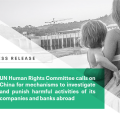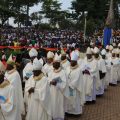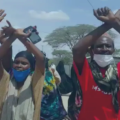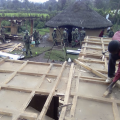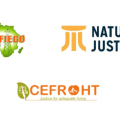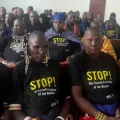The Conference of the Parties (COP16) to the Convention on Biological Diversity (CBD) is being held from October 21st to November 1st in Colombia. This initiative has failed in its goal of halting the alarming loss of biodiversity. For 30 years, instead of putting an end to extractive companies’ destruction, the CBD’s proposals have worsened the situation – through actions that have undermined both the sovereignty of Indigenous Peoples and communities, and their ability to remain in the territories they inhabit and protect.
The destruction of biodiversity to feed corporate greed is readily apparent through alarming facts and figures: 54 percent of wetlands have disappeared since 1900; land degradation from human activities is causing the extinction of one sixth of all species; and 50 percent of agricultural expansion between 1980 and 2000 occurred on razed areas of tropical forest (1). In Asia, oil palm plantations have been the main driver of forest loss during this period.
32 years ago, during the Earth Summit held in Rio de Janeiro, Brazil, more than 170 countries pledged to take measures to halt this destruction. To this end, they signed the Convention on Biological Diversity (CBD). However, this initiative has failed spectacularly.
Despite their numerous declarations in support of taking action, and their adoption of goals and targets, governments have shown no real interest in taking the necessary measures to stop the destruction of biological diversity. By way of proof, one only has to review the targets established for the decade between 2010 to 2020, known as the Aichi Targets: none of them has been achieved.
The 16th Conference of the Parties (COP) to the CBD is being held in Cali, Colombia, from October 21st to November 1st, 2024. During this gathering, government negotiators aim to evaluate the countries’ progress in achieving the new targets set for the year 2030, which are included in the so-called Global Biodiversity Framework. Yet, over 85% of the countries missed the deadline to submit their new commitments before the start of the COP, revealing their ongoing lack of commitment (2).
To stop devastating biodiversity loss and try to reverse it, it would be necessary to put an end to the destruction in the first place. This destruction is caused by extractive oil companies, mining, agribusiness, plantations, hydroelectric dams, and other industries, as well as by other economic sectors that secondarily benefit from these destructive activities – such as airlines, banking, finance, investors, etc. Yet instead of stopping the destruction, the proposals implemented by the CBD tend to worsen the situation – through actions that undermine both the sovereignty of Indigenous Peoples and communities, and their ability to remain in the territories they inhabit and protect.
One of the concrete ways in which the CBD causes this kind of conflict is through the target known as “30 x 30,” which was promoted by large conservation NGOs. Its objective is for 30 percent of the planet – including the world’s land, fresh waters and oceans – to be declared as protected areas by 2030. However, this objective does not take into account the suffering and resistance of thousands of communities affected by the imposition of conservation areas in their territories – and the serious violations of their rights this has caused. Far from being a solution, this model of conservation without people actually generates conflict and violence, costing lives in the communities that lose control of the territories they inhabit.
Another major and worrisome threat coming from the Convention on Biological Diversity (and the corporate influence over it) is the inclusion of biodiversity offsets and credits as a legitimate mechanism to “repair” the destruction that companies have caused.
Through offsets, polluting industries assume the right to destroy territories, with the excuse that these damages and losses will be “offset” elsewhere on the planet. However, this is not possible. In a recent Statement, hundreds of civil society organizations warned that “biodiversity offsets can create conflicts over the right to own and use lands, fisheries and forests, and can compete with agroecology and smallholder agriculture, undermining food sovereignty. [These offset projects] will likely drive land grabbing, the displacement of communities, increased inequality in access to land, and human rights violations – just like carbon offsets do.”
This Statement warns that biodiversity offsets and credits seek to imitate carbon offsets and credits. But not only are they replicating the faults of carbon offsets and credits; biodiversity credits and offsets intensify negative impacts by including innumerable forms of life in a strategy of financialization. So far, these mechanisms have proven to benefit large corporations that continue to pollute – such as oil, mining and airline companies. They also benefit the associated chain of managers, certifiers, consultants and financiers that implement these mechanisms. Meanwhile, communities are suffering from the deception and impacts of these mechanisms, which have been widely documented by academia, the press, and other sectors.
We invite you to read the full statement, which also presents alternative proposals to another key point on the COP16 agenda: the financing of strategies to stop biodiversity loss.
This bulletin also includes articles about how tree plantations and offset projects are expanding and occupying territories, as well as other articles celebrating the resistance of communities.
One of the articles, from Gabon, documents the power of community resistance to Sequoia’s attempts to install 60,000 hectares of eucalyptus plantations in the Bateke Plateau region that would be used to generate carbon credits. Another article from the Republic of Congo describes how oil companies are grabbing land to set up tree plantations for the carbon market, so that they can greenwash their image. A third article reports from two provinces in Mozambique where eucalyptus plantations have obliterated the biological and genetic diversity of the machambas (traditional cultivation areas). In the wake of the pulp industry, major homogenization occurs, and the expression of the genetic diversity of seeds and local varieties disappears.
Another article analyzes the Thai government’s strategy to implement an offset-based climate policy, a concept which is inherently contradictory and which expands corporate control over community lands. And now the Thai government wants to extrapolate this idea from the climate and apply it to biodiversity. These offset projects would be carried out in “green areas” that would cover more than 50 percent of the country.
Finally, we present the third episode of the podcast entitled “Women’s Struggles for Land,” which aims to highlight the voices of women and their multiple forms of resistance to the occupation of their territories. This third episode, from Indonesia, was jointly produced with the organization, Solidaritas Perumpuan, and it recounts the experiences of women in the Kalimantan region facing plantation projects and REDD projects.
This collection of cases reveals how the kinds of actions proposed at the COPs affect people’s sovereignty over the territories they inhabit. Their sovereignty is indispensable in stopping the biodiversity crisis. In light of this situation, many peoples and communities around the world are reclaiming control of their territories and are fighting to defend them. In so doing, they are defending biological diversity and life itself!
Orginal Source: World Rainforest Movement (WRM)
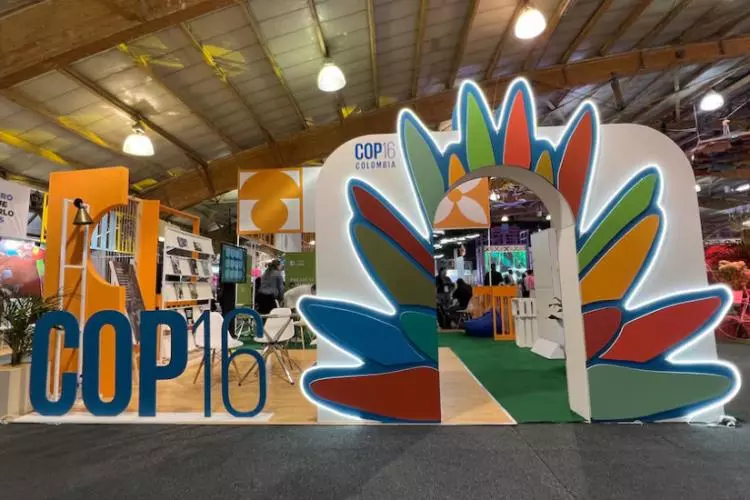

 MEDIA FOR CHANGE NETWORK1 week ago
MEDIA FOR CHANGE NETWORK1 week ago
 MEDIA FOR CHANGE NETWORK2 weeks ago
MEDIA FOR CHANGE NETWORK2 weeks ago
 FARM NEWS2 weeks ago
FARM NEWS2 weeks ago
 MEDIA FOR CHANGE NETWORK5 days ago
MEDIA FOR CHANGE NETWORK5 days ago
 MEDIA FOR CHANGE NETWORK5 days ago
MEDIA FOR CHANGE NETWORK5 days ago
 MEDIA FOR CHANGE NETWORK2 days ago
MEDIA FOR CHANGE NETWORK2 days ago
 MEDIA FOR CHANGE NETWORK9 hours ago
MEDIA FOR CHANGE NETWORK9 hours ago

